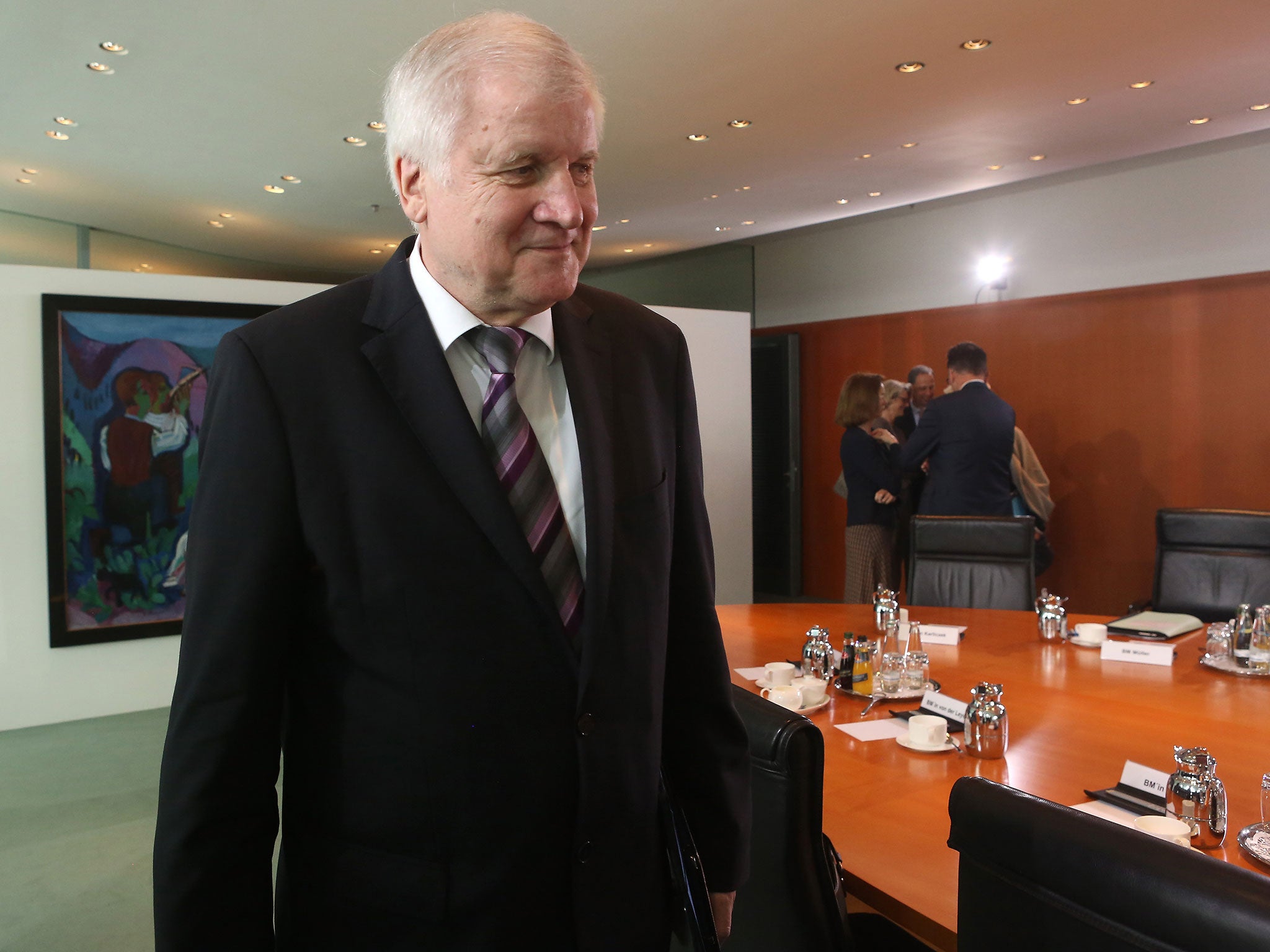Angela Merkel’s government under threat as interior minister offers resignation over immigration policy
Latest blow to chancellor as migration row threatens to tear fragile coalition apart

Your support helps us to tell the story
From reproductive rights to climate change to Big Tech, The Independent is on the ground when the story is developing. Whether it's investigating the financials of Elon Musk's pro-Trump PAC or producing our latest documentary, 'The A Word', which shines a light on the American women fighting for reproductive rights, we know how important it is to parse out the facts from the messaging.
At such a critical moment in US history, we need reporters on the ground. Your donation allows us to keep sending journalists to speak to both sides of the story.
The Independent is trusted by Americans across the entire political spectrum. And unlike many other quality news outlets, we choose not to lock Americans out of our reporting and analysis with paywalls. We believe quality journalism should be available to everyone, paid for by those who can afford it.
Your support makes all the difference.German interior minister Horst Seehofer offered his resignation to party colleagues late on Sunday, escalating a row over migration with chancellor Angela Merkel that threatens her fragile government.
Mr Seehofer said he was ready to step down as minister and as chair of his Christian Social Union (CSU) at a meeting where his party's leadership was discussing whether to accept immigration proposals Ms Merkel brought back from Brussels last week.
This latest development casts the future of the chancellor's government into yet more uncertainty.
Ms Merkel's Christian Democrats party (CDU) relies on the Bavarian conservative CSU to maintain power through a coalition formed three months ago to end a political vacuum.
Ms Merkel lost votes to the far-right in elections last September, and she has been forced to turn to European Union neighbours to help resolve the row over how to deal with migrants trying to enter the country.
Germany's political crisis is the latest sign of a growing divide across the EU between those who want to maintain open borders and those who want to restrict the number of migrants entering the bloc.
Mr Seehofer, who has demanded that Ms Merkel toughen her open-doors refugee policy, earlier told colleagues that in spite of the measures agreed with EU leaders.
The interior minister said he saw no alternative to turning some migrants back at the border, a party source said, an idea roundly rejected by Ms Merkel.
CSU leaders, divided over how to face down a challenge from the anti-immigration Alternative for Germany (AfD) in October's regional election, were reportedly trying to persuade Mr Seehofer to change his mind about resigning.
However, he told party colleagues at an executive committee meeting that discussions with Merkel had been fruitless, according to a party source.
Others in the CSU have pointed to opinion polls showing that Bavarians have more sympathy for Ms Merkel than for either Mr Seehofer or Bavarian premier Markus Soeder.
By appealing to migration hardliners in the CSU, they argue, the party could lose votes in the centre.
Earlier this week, EU leaders hammered out a deal to share out refugees on a voluntary basis and create “controlled centres” inside the European Union to process asylum requests.
The chancellor said in an interview with ZDF television that the formal agreements and verbal commitments she had secured from her EU partners would have the migration-stemming effect the CSU wanted to achieve, but in a more European-minded fashion.
She reiterated her determination to act in way that was “not unilateral” and that was “not to the detriment of third parties”.
“The sum of all we've agreed is equivalent to what the CSU wants - that's my personal view, but the CSU must decide for themselves,” she said.
A document circulated by Ms Merkel to coalition allies on Friday night outlined repatriation accords with 16 countries and proposed reception centres in Germany where migrants would undergo an accelerated asylum procedure -- steps that represent a significant hardening of her 2015 open-door asylum policy.
The Czech Republic, Poland and Hungary, where prime minister Viktor Orban has long sought to position himself as Ms Merkel's nemesis in the immigration debate polarising the continent, later said they had signed no bilateral agreements.
Additional reporting by Reuters
Join our commenting forum
Join thought-provoking conversations, follow other Independent readers and see their replies
Comments